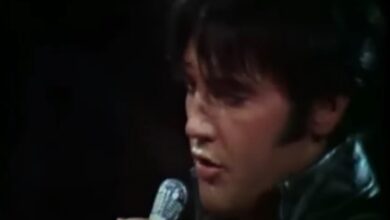When Country Music Was Both Authentic and True
Faron Young, a pivotal figure in country music history, was born in 1932 in Shreveport, Louisiana. His early years were marked by a deep affinity for music, influenced by the vibrant country scene of the South. Young’s talent quickly became evident, and by the age of 20, he was inducted into the prestigious Grand Ole Opry, a testament to his exceptional voice and stage presence.
Throughout the 1950s, Young’s career flourished with a string of hits that solidified his reputation as a leading country artist. Songs like “Live Fast, Love Hard, Die Young” and “Country Girl” not only topped the charts but also resonated deeply with audiences, showcasing his ability to blend traditional country themes with heartfelt storytelling.
Young’s decision to record Willie Nelson’s “Hello Walls” in 1961 proved to be a landmark moment for both artists. Nelson, then an emerging songwriter facing financial challenges, initially offered the song to Young for a modest sum. Instead of purchasing it outright, Young lent Nelson the money he needed while retaining the publishing rights—a decision that would significantly benefit Nelson as the song soared to the top of the charts.
“Hello Walls” struck a chord with listeners due to its poignant lyrics and relatable theme of loneliness and heartbreak. The song’s conversational style, where the protagonist addresses inanimate objects in his room, captured the melancholic essence of lost love, resonating across different generations. Its crossover success, reaching number 12 on the Billboard Hot 100 in addition to dominating the country charts, propelled both Nelson and Young further into the national spotlight.
Beyond its commercial success, “Hello Walls” became a cultural touchstone within the country music genre, inspiring numerous cover versions and even an answer song by Ralph Emery titled “Hello Fool.” Young’s rendition, with its distinctive vocal delivery and emotional depth, remains a standout in the annals of country music history.
Despite the tragic end to his life in 1996, Faron Young’s legacy endures through his contributions to country music. His 89 charting singles attest to his enduring popularity and influence, while his role in nurturing the career of Willie Nelson underscores his keen eye for talent and his generosity within the music industry.
For those interested in delving deeper into Faron Young’s life and his impact on country music, a wealth of resources—from biographies to archival recordings—are available. They illuminate not only his remarkable career but also the broader evolution of country music during a transformative era in American musical history.
&ab_channel=Jendor09





